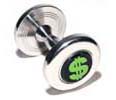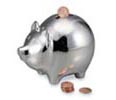 |
|
Get Out Of Debt
by: Talbert Williams
Do you ever feel like you know just enough about debt to be dangerous? Let's see if we can fill in some of the gaps with the latest info from debt experts.
Debt problems, debt consolidation programs and debt management are so pervasive in society today, I thought I might share a unique perspective you may not be aware of.
This point of view is from a business standpoint.
•Do you want to know why you receive endless streams of credit card offers?
•Are you curious why creditors hardly ever show up for consumer bankruptcy hearings to dispute your filing?
•Have you wondered why debt consolidators are all over the TV, radio, print and internet?
Quite simple: it's a business.
Need proof? Of course you do.
Have you ever looked at a credit card company's quarterly filing (10-Q) or yearly filing (10-K)? You may be surprised at what nuggets of information you find.
For the purpose of illustration, I've chosen two leading New York Stock Exchange (NYSE) traded companies. Both shall remain nameless, yet the facts can be gathered and confirmed quickly with a little research by you.
> Credit card company 1: For the quarter ended March 2005, default rate was 3.5%
So far, we've uncovered some interesting facts about debt. You may decide that the following information is even more interesting.
> Credit card company 2: For the quarter ended March 2005, default rate was 3.0%
What does this mean? It means about 3 - 3.5 out of every 100 people they issued credit cards to couldn't pay them back and were written off.
Why is this important?
It's a NUMBERS GAME. This is built into their business model and taken into account when they issue these mass "pre-approval" letters and sign up new customers. They know a percentage of you will never be able to pay them back. It's a risk they are willing to take.
What's more is both companies still made huge profits (and one even announced a quarterly dividend!).
> Credit card company 1 still managed a $500 million net income for this quarter.
> Credit card company 2 still managed a $515 million net income for this quarter (before one-time charges).
How do debt consolidators fit into the equation? Before you consider bankruptcy or defaulting on your balance, their job is persuade you to pay back these credit card companies an amount you can better afford. In return, these debt consolidators receive a flat fee or % of your outstanding balance.
By performing this service, the credit card companies make more money than they would had you simply defaulted - and debt consolidation becomes a booming industry. With average family debt between $8,000 - $10,000 (and growing) you now can see the business side of this. The bottom line is money.
Before you get severely depressed or consider doing something rash you might regret later, remember that this is a business. Customer default rates are built into each credit card company's business model. They know a certain percent of you won't ever be able to pay them back.
Yet, they are still raking in the money and printing pre-approved credit card offers at an incredibly rapid rate.
The bottom line here is to understand the corporate perspective. If you cannot pay back your creditors or are in a hole so deep you cannot get out of, shed the stigma and obligation of "I must pay them back or else the apocalypse will come to me." To them, you are just a number, a figure, a percentage.
Take this knowledge and choose the best option for YOU to get out of debt. Repeat this phrase: it's not personal, "it's business."
Hopefully the sections above have contributed to your understanding of debt. Share your new understanding about debt with others. They'll thank you for it.
Talbert Williams 2001-2006 All Rights Reserved
Talbert Williams offers free help and referals to help consolidate and eliminate your debt at: www.debt-free-america.com.
debteads@debt-free-america.com

 |
|
 |
|
What is True Wealth?
by Chris Cooper
What is true wealth? What should you expect if you reach the end of the gold paved road to financial freedom?
If you have a million dollars, will you be satisfied? What about 10 million? Is true wealth a numbers game or do other factors enter into the equation?
Ebenizer Scrooge of Dicken’s The Christmas Carol was very wealthy for his time, but before meeting the three ghosts of Christmas past, present and future, he lived a miserable life, too cheap to even heat his own apartment.
Meanwhile his clerk, with his many children, was portrayed as happy and loving - a great father.
Of course this is fiction, but is there any truth to the story?
Many people will work incessantly trying to accumulate more and more wealth, but a trite joke is that their last words are never: “I wished I spent more time at work.”
For some people the only answer to the question; “What is true wealth?", is money pure and simple - the more money the better.
Others would be content to say that true wealth is having the peace of mind of being free of debt.
Another will say he is truly wealthy if he can lead the lifestyle he chooses regardless of cost.
Others might say true wealth is being healthy and surrounded by loving family and caring friends.
There are probably as many answers to this question as they are people to answer it.
You could live in a big house on the hill, have two Mercedes in the garage and a million in the bank and not enjoy life as much as the guy who works in the gas station and lives in a two room furnished apartment.
True wealth is what one perceives it to be. And if it were not so, we wouldn’t have policemen, firemen and soldiers who risk their lives protecting us rather than trying to work on Wall Street, making big bucks.
We wouldn’t have doctors who travel to third world countries, just to try to make some difference, rather than to stay at home with a thriving practice and a comfortable life.
We wouldn’t have all the volunteers this country has, who are ready and willing to help the sick, infirm or destitute – or who suddenly turn up at disaster scenes willing to do anything to help.
This country wouldn’t have the millions of people who donate billions of dollars annually to the charities of their choice.
So even thought we concentrate on financial matters, it’s good to step back and realize there is more to true wealth than money.
I believe that having enough wealth to live a comfortable life makes lots of other things possible.
I also believe that being in debt is merely transferring your wealth to your creditors. While it may make them, or their shareholders rich, it really contributes little to your true wealth.
So my answer will be adopted from Mr. Spock’s famous Vulcan greeting: “Live Debt Free and Prosper.”
Chris Cooper is a retired attorney. Aided by his wife Aileen, who has an MBA in Finance they endeavor to provide personal financial planning advice. . For more personal finance articles, visit http://www.credit-yourself.com.

 |
|
 |
|
The Pay Cheque Myth
by Margaret Ntifo
There is a simple reason why most people are not wealthy today!
They are looking for the wealth in the wrong places.
The pay cheque!
Sadly, a large percentage of today's workforce devote their best efforts at labouring patiently at their jobs in the mistaken hope that wealth will come to them as a by-product in the process. They succeed at becoming skilful at their jobs, which is what they set out to do in the first place. But then they wonder why they continue to live hand-to-mouth. Wealth, however, cannot be found in a monthly pay cheque or salary.
A different mindset is required beyond the pay cheque to realise sustainable wealth. There is a marked difference between working for money and putting your money to work for you by investing in or creating assets that produce income for you.
It is indeed very honourable to work, and get paid for what you do. It certainly beats a number of other activities that I will not list in polite company. The first definition of the word occupation is 'An activity that serves as one's regular source of livelihood; a vocation'. Two further definitions though are 'The state of being held or possessed' or 'Invasion, conquest, and control of a nation or territory by foreign armed forces'.
Think about it.
Is your pay cheque holding you hostage?
What level of freedom or choice do you have without it?
How will the loss of your pay cheque affect your lifestyle?
The smartest thing you could do for yourself is to forget the myth that there is security in your pay cheque, and use it as a stepping stone to wealth. That's a millionaire habit.
There is no security in a pay cheque, however large it might be. And if you persist in living it all up you fall into a spiral trap of the month-to-wages treadmill. This is an illusion of security. Most people live in the familiar world of guarantees mostly because they know no other world. They invest a significant part of their lives in the 36-plus-hour working week, the conventional workplace, the guaranteed paycheque, and retirement plan.
Many others choose the free world, the world of no guarantees. Here there is no prescribed 36-hour week. Instead, there is the unconventional workplace with no guarantee of a paycheque, the lack of which seems to well-equip these people with skills to create real wealth.
No significant creator of wealth has been a wage earner alone! They are people who are willing to accept the world of no guarantees and will put their time, energy, creativity and effort into creating their own world. They are willing to accept total responsibility for their own lives.
The next times you receive your pay cheque retain a minimum of ten percent to invest in your future. Even the Babylonian parables attest to this. Yes, it may seem a trifling beginning. Remember: 'Little drops of water make a mighty ocean'. Soon you will look back with pride at what you have created from your paycheque. Above all, you would establish a long-term habit that will help you in many ways.
As soon as you have enough, buy assets. Buy shares. Buy properties. Start a business. Find yourself a mentor or a good wealth coach to assist you. That is the foundation of your security.
When you reach the stage where the income from your assets exceeds your pay cheque, that is the beginning of your freedom.
Margaret Ntifo is a Wealth & Prosperity Coach and author of 'The Money, Wealth and Prosperity' E-Program and 'The Dairy of an African Princess...'
You can subscribe to her free 7-Day e-course at: http://www.moneywealthandprosperity.com/mini_course.html

 |
|
 |
|
Debt disaster planning
by Sidney Winthrop
Debt disaster planning
Your financial comfort zone is that level of debt where you don't worry about your debts because they are easily managed and cause you no worries. If you are carrying a heavy debt load your debts will weigh you down and give you concerns even though you can manage to pay the bills each month.
If you have a secure, reliable income your comfort zone will be higher than if your income is insecure and less reliable. Your debts may seem to be manageable but that does depend on everything staying the same. Unfortunately very few things do stay the same. It is one of the few certainties in life, things will change. So how ready are you to cope with change in your financial circumstances?
The greatest fear for most people is of losing their job through ill health or redundancy. It may seem that it's ok to be spending like a drunk in a bar when you have a job but, if that job were to disappear how long would you survive? The closer you live to the edge then the easier it would be to slip over that precipice.
Your credit rating would be damaged straight away so your interest rates could rise. All this at the same time as your income has come to a standstill. Think about that. If you had no money coming in, how long could you keep up the repayments? The debts aren't linked to the job and will still need to be paid even after the job has gone.
Disaster is always unexpected, accidents by their nature are accidental and unexpected. The emergency services cannot know exactly when and what they will be needed for but they still plan. They make plans for various scenarios and then adapt the plan to suit the circumstances. You should do the same with your financial planning. You can't know what might trip you up but you can plan to deal with possible changes.
Examine your financial situation. Consider the possibilities for reducing your debts using debt reduction strategies. Look at what you are spending your money on and consider if it really is vital to have all those gadgets and gizmo's, the new dress or to spend quite so much money eating out in restaurants. You don't have to live like a pauper but trying to live like a millionaire will probably mean you will never become one.
The days of the "Job For Life" are long gone. We have to adapt to survive and burying your head in the sand is not a survival strategy. It will merely expose your rump for others to feed on. Wise up and wake up, it really could happen to you. Get control of your finances manage your debts and debt levels and be prepared for any eventuality. You will have your plan to fall back on and be able to adapt it to your new circumstances.
The author, Sidney Winthrop specialises in articles about personal finance and debt reduction. More information can be found at http://www.moneywell.co.uk

 |
|
 |
|
What Is A Debt Free Consolidation?
by Talbert Williams
Debt free consolidation does not add a new loan to your existing debt. Rather, it combines your current debt into one lump sum amount, thereby making it cheaper, manageable, and stress free.
After initiating the debt consolidation process, the monthly payments become lower and more cash is freed up in the monthly budget. Cash can then be diverted towards savings that will help the borrower stay debt free.
Debt free consolidation is meant for those who are unable to meet their monthly debt obligations but whose debts are current. It works for people who have not fallen behind on repayments by not more than three months.
Those borrowers whose unpaid dues do not exceed three months at a stretch and who skip payment to one creditor to pay another will benefit the most from this debt free consolidation. Others will find it difficult to find an effective debt free consolidation plan.
There are several places debtors can obtain debt free consolidation services. The best place to start is with the bank or credit union with which an individual is already doing business. Since the client is aware of the credentials of the organization, he will not need to exert to much extra effort.
And that bit of extra effort can help you find whether or not the institution is trustworthy or not.
Furthermore, with the spread of the Internet, there are many companies that advertise on the Internet. Researching these companies is very difficult and hence, it is important to be completely satisfied before committing to any particular organization.
Utilizing the services of these companies is most convenient, as debtors can get advice and service without even leaving the confines of one's home.
One can view the options available and compare them with other such companies with utmost ease. Debt free consolidation stops the annoying collection calls and help you start afresh.
By making use of debt free consolidation, you will radically increase your chances of attaining financial freedom in the near future.
Talbert Williams offers free help and referals to help consolidate and eliminate your debt at: www.debt-free-america.com.
debteads@debt-free-america.com

 |
|
 |
|
Getting Out Of Debt As Quickly As Possible

by Kyle Greatbatch
One of the most important things you can think of is how to get out of debt as soon as possible, especially if your debt is significant.
This incredible important task can seem very mighty, but if you take certain appropriate steps, it can be easier than it seems. For instance, I am now almost out of debt compared to what my situation was just a decade ago.
You would be shocked if you knew what my situation was before I paid off my debt in full.
Like many people, I got my first credit card while still in the college. If you don't know, this is the worse time in the world to get a credit card.
At such time you would get into debt with the vain hope that you would easily get out of debt in the future.
The idea that you would easily get a good paying and great job after graduation makes matters worse.
For me, the credit cards kept coming while in college. They were handy to a poor college student like me. There was one time when I took a very hefty cash advance for the purpose of paying tuition.
It was a very good idea to me, back then. I was also able to afford all the newest fashions and other accessories on credit. To me, there wasn't anything to worry about as I would get out of debt with ease as soon as I entered the labor market.
How wrong I was!
After college, the great job I was dreamed of was more elusive than ever. By the time I started work I had a high stack of unpaid bills.
In my mid-twenties I knew that I had to get out of debt fast or crash under the load of debt. Sadly, there wasn't any way for me to get out of debt. I didn't spend the money overnight, so how on earth did I expect to get the money to pay it off overnight?
Eventually I found the steps which I took to get out of debt. You can follow these steps too and it won't take you as long as you think.
The first thing you need to do is for you to take action. Don't continue to wait for one more year or one more month before you start on your plan to get out of debt.
Decide, then make a plan. Don't let your old habits get in the way.
First, pay off the credit cards that have the highest interest rates. Never allow the months to pile up before paying the minimum. If you do, it would take you decades before you can pay off the high interests on the credit cards.
Also, make a list of all those you owe. Then make your plan of repaying them. Many creditors would be willing to take a payoff which is less than your balance.
And of course - stop using your credit cards while trying to get out of debt. Follow these steps and they will help you get out of debt faster than you can ever imagine.

 |
|
 |
|
Credit Card Debt Relief Guide
by Mansi gupta
Now large sum of money, making timely and untimely payments anytime and anywhere, purchasing items online, making hotel reservations, borrowing money from organizations etc. is not a matter of much concern. With the advent of plastic money or credit card, money related issues have simplified to a great extent. Credit card has come up as an incredibly beneficial financial tool.
Though credit cards come with a plethora of advantages there are quite a few disadvantages too. If the credit card is not use judiciously, it can land you into serious problems. For behind the plastic money is the real money and the real debt. So there are several crucial points that you must bear in mind prior to purchasing a credit card and running into debt via it.
* Before applying for a credit card, make it a point to discuss your financial needs and situations with your financial advisor.
* If he permits you to take a credit card, then make sure that make sure that you use it wisely. For taking a credit card is akin to taking a loan. You have to pay what you owe.
* Once you start using your credit card, always check your exact balance before you move out of your house. The little purchases also add up in the expense.
* Once you have gone through your credit card slips, don't throw them away. Always keep your credit card receipts and compare them with your monthly bill. If you find any discrepancies, report your credit card company instantly.
* The best way to avoid running into debt is never to owe more than you can repay. This can damage your credit and credit ratings, annoy your creditors and therefore obstruct your approval for any further loan you seek to take such as car loan, mortgage insurance etc.
* Make sure that you pay your bills on time. For not doing this will burden you with heavy interest rates, thereby making it all the more difficult for you to pay the amount. Also try to pay your complete bill. Do not involve yourself in making partial payments.
* Moreover don't make the mistake of paying the bill of one credit card with another. This will lead you in a vicious circle from where it will be very difficult for you to come out.
However if at some point of time you find yourself running into credit card debt, the foremost thing that you must do is to stop further usage of the card. Though it is very difficult to do so and can badly affect your credit ratings but it is better to stop as soon as possible.
Secondly you should plan out a budget of your monthly expenses. Since you are running short of money try to minimize the expenditure as much as possible and also try to adhere to the budget. This might not help you save money or repay your debt but will surely not let your debt increase in any way. As a rule your non-mortgage debt payments should not be more than 15 percent of your pay per month.
Mansi gupta recommends that you visit Credit Card Debt Relief for more information.

 |
|











